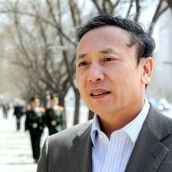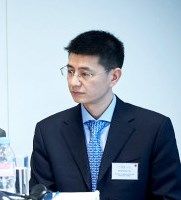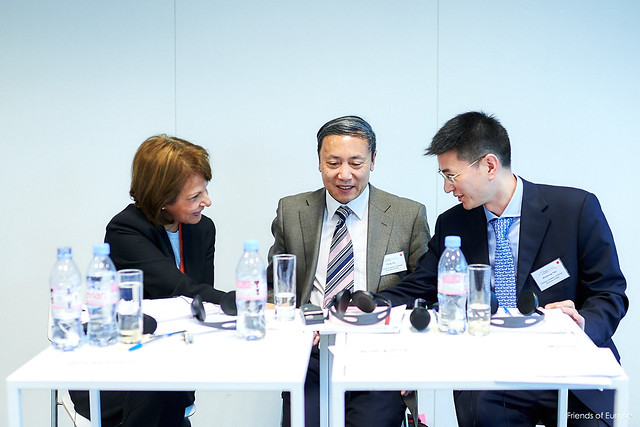
Summary
China’s 13th Five-Year Plan (FYP) focuses on ensuring China’s transition to a more open socialist market economy, participants heard during a Friends of Europe policy briefing in Brussels.
The 13th FYP reflects the ‘New Normal’ of “moderately high” but good quality and sustainable growth. “The ageing rate of China’s population is greater than in any other developing country,” said Cai Fang, Vice-President of the Chinese Academy of Social Sciences (CASS) and member of the advisory board of the 13th FYP. “We haven’t gotten rich yet, and we are already old.”
Indeed, China’s ageing society should be looked at as a positive point, a sort of second demographic dividend of retirees driving a boom in the health and tourism industries. “There are many investment opportunities related to an ageing society. Opportunities that are open to all parties,” he added.
Opening up opportunities is one of the central ideas behind the 13th FYP, noted speaker Yao Zhizhong, Deputy Director of the Institute of World Economics and Politics at the CASS. “We aim to develop a new open society under the new FYP, and we will play by international rules,” he said.
Important steps have already been taken in this direction with the opening and subsequent expansion of the Shanghai Free Trade Zone (SFTZ), wherein foreign investors can operate under the rules of free trade. “We hope to see more foreign investment in the SFTZ,” he said, “and we hope to see more opening up in the rest of China, especially in the health and service sectors.”
About
China’s new five-year national socio-economic blueprint to be released in March this year will set the world’s second largest economy on a new development course for 2016-2020. The first such roadmap to be adopted under the leadership of President Xi Jinping, the 13th Five-Year Plan is expected to put innovation at the centre of China’s future development. Among other key priorities, the Plan will aim to “green” the Chinese economy, help the shift from manufacturing to the service sector, cultivate strategic industries and modernise agriculture.
- What are the key areas which will get priority attention in China over the coming five years?
- How does China’s development blueprint fit in with global challenges in areas such as sustainable development, climate change and global governance?
- Does the new Plan open up new opportunities for cooperation for China’s foreign partners, including the European Union?
IMAGE CREDIT: CC / FLICKR – Dhi
Schedule
China’s new five-year national socio-economic blueprint to be released in March this year will set the world’s second largest economy on a new development course for 2016-2020. The first such roadmap to be adopted under the leadership of President Xi Jinping, the 13th Five Year Plan is expected to put innovation at the centre of China’s future development. Among other key priorities, the Plan will aim to “green” the Chinese economy, help the shift from manufacturing to the service sector, cultivate strategic industries and modernise agriculture.
- What are the key areas which will get priority attention in China over the coming five years?
- How does China’s development blueprint fit in with global challenges in areas such as sustainable development, climate change and global governance?
- Does the new Plan open up new opportunities for cooperation for China’s foreign partners, including the European Union?
With
Cai Fang
Vice-President of the Chinese Academy of Social Sciences (CASS) and Member of the advisory board of the 13th Five-Year Plan on National Economic and Social Development of China
Yao Zhizhong
Deputy Director of the Institute of World Economics and Politics at the Chinese Academy of Social Sciences (CASS)
Moderated by
Shada Islam
Managing Director at New Horizons Project
Speakers

Vice-President of the Chinese Academy of Social Sciences (CASS) and Member of the advisory board of the 13th Five-Year Plan on National Economic and Social Development of China
Cai Fang is Vice-President of the Chinese Academy of Social Sciences (CASS) and a member of the advisory board of the 13th Five-Year Plan on National Economic and Social Development of China. In addition to his current position, Professor Cai is also a member of the Standing Committee and the Rural Affairs Committee of the 12th National People’s Congress of China. He has published extensively on the Chinese economy, ranging from China’s economic reform to employment, population migration and income distribution.

Managing Director at New Horizons Project

Deputy Director of the Institute of World Economics and Politics at the Chinese Academy of Social Sciences (CASS)
Professor Yao’s research fields are macroeconomics and international economics. He has published numerous papers and books on the Chinese and world economy, including Income and Price Elasticity of China’s Export, China’s Outward Foreign Direct Investment, and Economy in the Euro Area: Regaining Growth Momentum despite Difficulties.
Partners
Coorganized with

Activities
Europe-China Forum 2025
Next event In person & livestreamed

- Area of Expertise
- Global Europe
Trading tariffs and trade as a geopolitical tool
Past event

- Area of Expertise
- Global Europe
From aid to investment: shaping Europe's global role in a changing world
Past event Online

- Area of Expertise
- Global Europe
Future Africa-Europe High-Level Forum
Past event IN PERSON & ONLINE

- Area of Expertise
- Global Europe
Trump's betrayal of the world's poor is Europe's opportunity
- Category
- Frankly Speaking
- Author
- By Giles Merritt
Policy Voices | #Throwback: UNRWA’s Jonathan Fowler on Gaza: “It is a…
- Category
- Podcast
- Area of Expertise
- Global Europe
DRIVE Impact Initiative final report
- Category
- Event Reports
- Area of Expertise
- Global Europe
Europe’s blackouts call for a NATO-level response
- Category
- #CriticalThinking
- Author
- By Maurizio Geri

- Area of Expertise
- Global Europe

- Area of Expertise
- Global Europe

- Area of Expertise
- Global Europe

- Area of Expertise
- Democracy
Continue
the debate on
- Debating Europe

